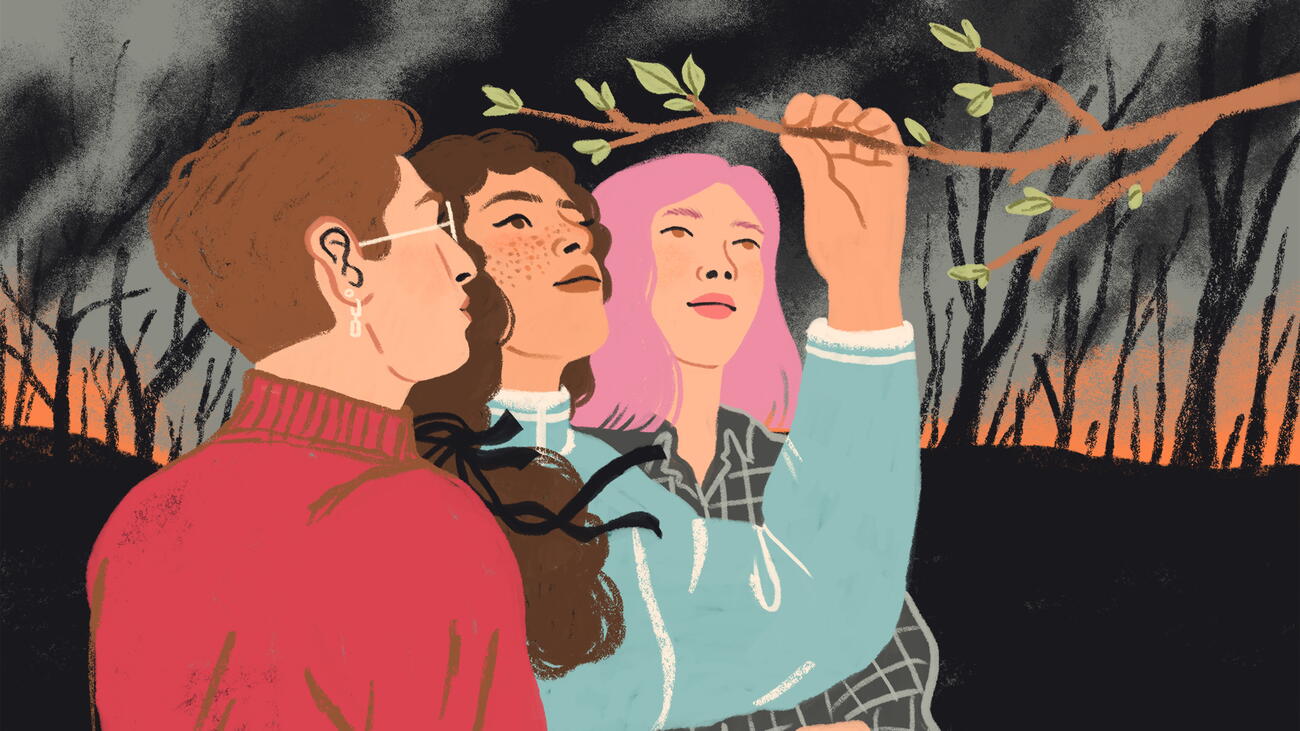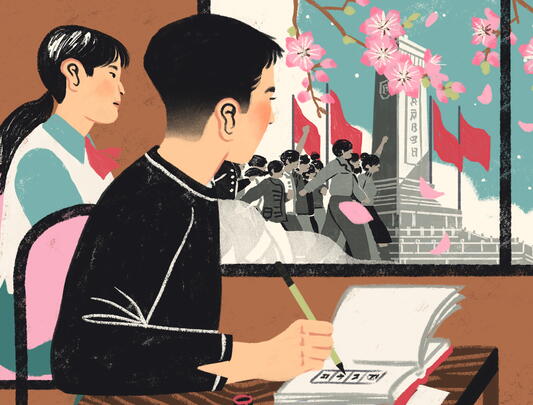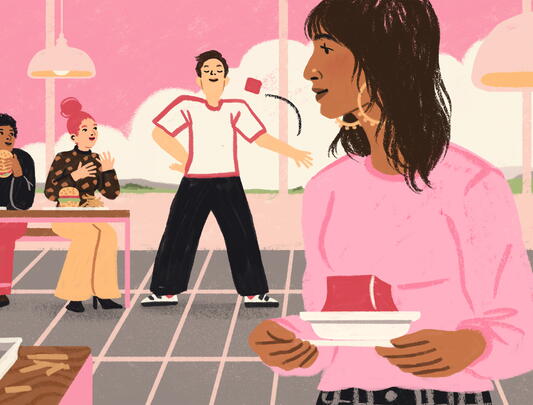Short Fiction
2025 Finalist: Ghosts
Marnie’s family dog had died. A big friendly yellow lab, he had perished doing what he loved most – eating things he shouldn’t. Marnie spent the day at the field site brushing away tears with her dirt encrusted hands. She was making mud under her eyes.
“I’m really sorry,” I told her as we ate our dinner in the van, canned chili with rice, spicier than we had expected, our noses all running. “Losing a pet is so hard.” At my words, Marnie’s eyes filled up again.
“It feels,” she had a hitch in her voice, “like the end of childhood. He didn’t know I had grown up.”
It was halfway through July, and my second week in the van with Marnie and Curtis. It was a rather unusual summer job. I had seen the flyer advertisement on a bulletin board in the UBC forestry building, the words “Hiring Field Assistants for the Summer Season” emblazoned on a picture of happy looking undergraduates with tools. I applied for the position, and three weeks later was in a group interview. The research supervisor was a woman in her early 50s. She had a kind face, a grey bob, wore a sweater that I suspected she had knit. She told us to call her Jo. She was assessing new tree growth in wildfire sites. I had googled her before the interview, had read some of her papers. I had seen a photo of her with her four teenage children, and I harboured a little guilty feeling that I would like her to be my mother.
“There’s beauty in this work,” she told us. The other undergraduates and I were seated in a circle. The windows were sleek with rain, and the summer was far away. “What could be more hopeful than new life after destruction? Figuring out how these ecosystems are responding to wildfires will help us understand how scientists can assist in their remediation.”
Jo hired seven assistants; four would be stationed at the main site in eastern BC, and the other three were myself, Marnie, and Curtis. We would be spending eight weeks in a van, driving around the province to assess various swaths of ghostly forests.
“It can be challenging, just a few people together for so long,” Jo told us. “But I think you three seem like you had the temperament to handle it.”
I worried she was wrong. I recognized Marnie from courses, from her frequent hand raising, her referencing of books she’d read, theories I'd never heard of. I felt wary of her. This sentiment was exacerbated by her beauty. Her hair was long and curly, a deep brown like the dirt we would spend the summer probing for moisture levels. I was ferociously jealous of the freckles scattered across her cheeks. Curtis, I had no real opinion on. It was his second year as a field assistant. He was in his final year of his degree, would be starting as a graduate student in Jo’s lab in the fall. He said cynical things, wore wire rim glasses, dangly earrings.
Our first field site was in the Okanagan Valley. We drove by vineyards, deep blue lakes, peach stands and strip malls. “I call this colour ‘grey-ige,’ for grey-beige,” Curtis told me, gesturing to the hills. The site was full of blackened wispy trunks, orphaned children pushing through the dirt. I was crouched down, taking soil measurements, when the device I was using began to flash, signalling low battery. Marnie was in the neighbouring transect, and I walked over to see if she was done with her tool. She was standing with her forehead pressed against the grey corpse of a tree, her lips moving inaudibly. A stick I had stepped on snapped, she turned to look at me. Her hair was in a French braid, and curly wisps framed her face.
“Careful,” I warned her. “That’s standing dead. You don’t want to put weight on it.”
“Standing dead,” she smiled. “What a lonely name.”
“What are you doing?” I asked her, curious by this antic. I didn’t feel I knew Marnie yet. For all her bravado in class, she had been quite quiet during our week together.
“I’ll tell you, but you can’t make fun of me.” She left the tree and walked over, looked at me intently. “I like to try to communicate with the trees, with their spirits. They might be dead physically, but I feel like they still linger here. And I like to apologize. Tell them it shouldn’t have happened this way, that I wish it hadn’t.” Her frankness startled me. The three of us had talked a lot about the work, about the science. We hadn’t talked about how it made us feel.
“Does it help?” I asked. “Does it make you less sad about all this?” I gestured to the ashy land around us.
She tilted her head. “I don’t know. I think it makes me feel more connected though. Less extractive.”
Marnie’s earnestness, her vulnerability, could have made me dislike her, could have increased the wariness. But I decided I would like her instead.
The summer went by quickly. In the evenings we would play cards and three-way games of cribbage, and type measurements into Excel sheets. Sometimes we would ignore each other, lie in our bunks on our phones, and sometimes we would talk until late, then go outside and gaze up at the stars, magnificent in the uninterrupted dark. Curtis wore on me sometimes; he acted as though his two years on us was a decade, tended to do a lot of sighing at our inefficiency. But he could be unexpectedly sweet. The night Marnie cried for her dog, for the last vestige of her childhood, he put his arms around her and made her a cup of tea, while I, a bit disturbed by her raw emotion, hung back.
In August, we were in northern BC near 100 Mile House when a wildfire broke out, about 50 kilometres to the east. It quickly grew out of control. “We should go get some real-time data,” Curtis joked. I could taste the ash in the air, it was hot and dry on my tongue, in my lungs. We wore N-95s, and I missed Marnie’s freckles. The sun blazed red.
“It looks so furious,” I commented to the others.
“The sun isn’t furious.” Marnie was squinting up at it, a hand shielding her face. “The sun doesn’t care.”
Jo was worried, she called us every few hours to check in. When the news began to discuss the possibility of evacuation, she ordered us away from the town, told us to head north to Houston, stay in a motel a few days, wait for it to blow over.
We were bored during our week in Houston. On our last night we decided to go out to a bar. There was a live band playing, and jeans and flannel shirts and boots danced and stomped and sang. We consumed 10 dollars’ worth of the two-dollar beers, and we swung each other around the floor, enjoying being 20, enjoying intoxication, enjoying dancing in a town we’d never return to on a warm August evening.
“I’m so glad we’ve become friends, Tia.” Marnie was a wide sloppy smile; she was muscled bare arms wrapping around my neck and squeezing me tight. We were the same height, our faces were close, our foreheads nearly touching. I was reminded of the first week of the summer, of the standing dead.
The wildfire ended, and so did the summer. In a few years, other students would drive to the swath of forest we had choked on that August. They would give it a site number and they would record the life and death in a spreadsheet.
Three weeks into the fall semester, I ran into Marnie. She was with a boy she had been texting on those evenings lying in the bunks. He was tall and elegant, and she introduced him to me as her partner. I was late to a meeting, I told her we should catch up later. I walked away, and then I stopped and looked back, and I watched for a second the swinging embrace of their hands. Like tree roots, I thought to myself, and then banished the thought for its earnestness.
Curtis was the TA in my ecology lab that semester. He liked to poke fun at my poor skills in tree identification. “Next summer I’ll have to get a job looking at alive ones,” I'd reply.
“You seen Marnie recently?” He asked me one day, as he looked over my seedlings worksheet.
“I messaged her last week, but she didn’t respond.”
“Yeah, I talked to her on Main Mall the other day,” I told him, as he marked a red X over what I had identified as a Western Hemlock. “She was with her new boyfriend. He seemed nice.”
Curtis gave me a smile. It was sweet and condescending, like he always was. “Guess we both lost there, huh?”
I recalled then, Curtis’s glances throughout the summer. The way he would always take the passenger seat when Marnie drove. How he would move her cribbage pieces, but not move mine. Little slight things, barely solid.
“Huh.” I smiled back, and I wondered what my smile contained. “I guess we did.”
The alumni UBC Short Fiction Contest
“Ghosts” was chosen as one of three finalists from over 70 entries in alumni UBC’s second annual short fiction contest for alumni. Many thanks to UBC’s School of Creative Writing and UBC Okanagan’s Faculty of Creative and Critical Studies for their support.


























